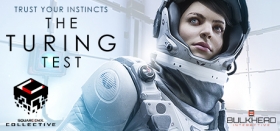
The Turing Test Review
I saw The Turing Test first at EGX Rezzed and it immediately caught my eye: it’s a first person puzzle game that deals with Artificial Intelligence, which is basically two of my top five favourite things. After the Rezzed demo, I left feeling very excited for it’s release, and now I’ve completed it I feel rather smug.
The Turing Test joins an alumni of excellent games in this genre, each with their own unique twist on the formula. Turing Test is no different, though I’d say that it was most similar to Q.U.B.E in how it does it’s puzzles. You are given an EDS, a gun that allows you to absorb and expel different coloured balls of energy in order to solve the puzzle. There are four different colours: Blue stays on permanently, Green oscillates, Purple oscillates at the same speed but alternately, and Red only works for a few seconds. Each puzzle requires you to use those energy balls to manipulate the levels’ machinery.
These are pretty standard first person puzzle game fair: moving platforms, conveyer belts, cubes and complete out of body experiences. Oh, that isn’t normal, is it? Something that is explained in the excellent story but is too much of a spoiler to retell here allows - and requires - you to control robots, creating a pseudo co-op mode on a lot of the later levels. This was a very welcome change, both because it did something very interesting narratively and it changed up the standard puzzles and make them much harder - up to that point I hadn’t really found much difficulty stopping my progress.

Europa is a bit cold for mood lighting
Throughout the game, concepts of Artificial Intelligence are name dropped and explored in a rather simplistic but broad way. These are woven into a story about long term space travel and life on another celestial body, and they never feel shoehorned in: Everything fits in to create a well-researched world. The game is set in a mining base on Jupiter’s moon, Europa, and in the rooms you’re not solving puzzles will be tablets, computers and pieces of paper that serve to build the universe, from emails to research papers.
The story has effectively already happened: a vast majority of what you can trust is told through audio logs and emails left by the inhabitants of the now abandoned Europa station. Guided by AI Tom, you have to solve some common sense puzzles that are repurposed Turing Tests - experiments designed to differentiate between Human Consciousness and Artificial Intelligence. It’s not quite what Turing would have imagined, but this is an interesting take on the 70 year old discussion.
Many first person puzzle games have very simple textures and low poly graphics, and while The Turing Test doesn’t have the most detailed texture work it is a ridiculously pretty game. All the living quarters and communal spaces are so detailed, it really felt that I was rifling through my crewmates things. I’d wager that you could play this in VR and it would look amazing.

This floor is very shiny
The soundtrack is excellent too: An electronic symphony mixing peaceful stringed music with futuristic-sounding tones sounds like a new addition to Holst’s The Planets. Adding to this is excellent voice acting, especially for Tom: At points throughout audio logs and story, he shows robotic emotion in a way reminiscent of J.A.R.V.I.S from the Iron Man film series, and is generally an amazingly written and performed character.
I will say that these audio logs can only be heard while standing at the computers they’re stored on, and some of them can be quite long. There isn’t a lot of space to explore while you’re listening to these, but it can be quite a break of pace to stop and not move for three to four minutes while you listen to these lore drops. I did it because I’m already interested in what they have to say - and I’m really glad I did - but I wish that you could move about while you listen to them.
Overall, The Turing Test is superb: it creates interesting puzzles with mechanics that we haven’t really seen in this genre yet in a well thought-out and designed world. The puzzles aren’t especially difficult, but there are certain sections that require you to think exceptionally laterally, which is again something you don’t often see in these kinds of games. I highly recommend that anyone who has enjoyed first person puzzle games in the past picks this up, and that everyone else should highly consider it.

Did someone leave a window open?
The Turing Test (Reviewed on Windows)
Excellent. Look out for this one.
An excellent game visually, mechanically and with it’s strong story and acting, this should be in your libraries.








COMMENTS